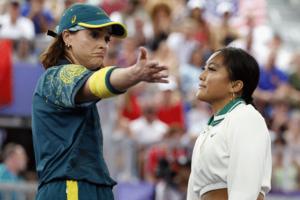Sports
/ArcaMax

Olympian Gary Hall Jr. will receive 10 replacement medals after Palisades home burned down
When Gary Hall Jr. saw the flames of the Palisades fire rapidly approaching, he grabbed his dog Puddle, a few family mementos, his insulin and left everything else behind — including five gold, three silver and two bronze Olympic medals that he had tucked away in a closet.
When he fled his home on Lachman Lane Tuesday morning, Jan. 7, nearby ...Read more

Gary Hall won 10 Olympic medals in the water. Then he lost them in the Palisades fire.
LOS ANGELES — Gary Hall Jr. didn't think anything of the small, off-colored cloud he saw from inside the kitchen of his Pacific Palisades home Tuesday morning.
Then he noticed a narrow plume of smoke in the sky that doubled in size within a minute.
And he smelled smoke.
By the time he saw flames coming out of houses uphill in the distance, ...Read more

Olympic track medalist Fred Kerley is tased in Miami Beach, cops say
MIAMI — An Olympic medalist was jailed Thursday night after getting tased by Miami Beach police when they claim he argued with officers and tried to force his way through an active scene.
Miami-based Olympic sprinter Fred Kerley, 29, who finished on the medal stand in both the 2020 and 2024 Olympics, was arrested following what police ...Read more

Mark Story: Why we will remember 2024 as greatest sports year ever in Lexington, Ky., history
LEXINGTON, Ky. — However one feels toward the tumultuous year that has been 2024, there has been one unmitigated positive for we locals: Sports figures who were reared in Lexington have produced a year of unprecedented triumph and acclaim.
In the spring, thoroughbred horse trainer Kenny McPeek — graduate of Tates Creek High School — ...Read more

Here's why LA28 officials are not worried about Trump's support for the Olympics
LOS ANGELES — President-elect Donald Trump's vow to make a "radical change" in government spending has raised concerns about Los Angeles' effort to host the 2028 Summer Olympics.
The private LA28 organizing committee has promised to cover the main cost of the Games, at an estimated $6.9 billion, through corporate sponsorships and other ...Read more

LA Olympics boss Reynold Hoover uses wartime problem-solving skills to plan 2028 Games
LOS ANGELES — The man in charge of preparing Los Angeles for the 2028 Summer Olympics was never an elite athlete. Never even worked in sports before.
So when Reynold Hoover talks about his new role as chief executive for LA28, the private group responsible for staging the Games and the ensuing Paralympics, he often refers to his stint as a ...Read more

Viral Olympic B-girl Raygun says she is done with competitive breakdancing
Breakdancing won't be an Olympic sport in 2028. And even if it was, the woman who is arguably the world's most famous B-girl would not participate.
Rachael Gunn, the Australian breakdancer better known as Raygun, said this week she will no longer take part in elite competitions after being widely mocked for her unorthodox routines at the Paris ...Read more

LA 2028 Olympics organizers hire top Nike executive to help boost revenue
LOS ANGELES — The private organizers of the 2028 Summer Olympics in Los Angeles have hired a top Nike executive to help generate the money they need to balance their $6.9 billion budget.
John Slusher, who formerly oversaw global sports marketing for the sneaker giant, will become chief executive of LA28's commercial operation, the group ...Read more

LA's promise of 'car free' Olympics running short on time and money
LOS ANGELES — With Los Angeles Olympics four years away and no detailed transportation plans yet, officials are concerned about a lack of money and time to create the "car free" Games that Mayor Karen Bass has promised.
Local officials have a litany of projects they want to complete ahead of 2028, from adding charging infrastructure to ...Read more
Popular Stories
- Olympian Gary Hall Jr. will receive 10 replacement medals after Palisades home burned down
- Gary Hall won 10 Olympic medals in the water. Then he lost them in the Palisades fire.
- Mark Story: Why we will remember 2024 as greatest sports year ever in Lexington, Ky., history
- LA Olympics boss Reynold Hoover uses wartime problem-solving skills to plan 2028 Games
- Olympic track medalist Fred Kerley is tased in Miami Beach, cops say





